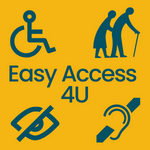
Unlocking the Benefits of Accessibility in the Hospitality Industry
Unlocking the benefits of accessibility in the hospitality industry involves making changes to your facilities and services to make them more inclusive and accessible to people with disabilities. Here are some of the key ways that hospitality businesses can unlock the benefits of accessibility:
-
Conduct a accessibility audit: Start by assessing your facilities and services to identify areas where improvements can be made. This may include installing ramps, elevators, or automatic doors, and providing accessible restrooms and guest rooms.
-
Provide training: Provide training to your staff on the importance of accessibility and how to meet the needs of guests with disabilities. This can help to ensure that everyone is aware of the changes that have been made and how to provide the best possible service to all guests.
-
Promote your accessibility: Make sure that your guests are aware of the accessibility features that you offer. This can be done through your website, marketing materials, and in-person interactions with guests.
-
Offer accessible services: Consider offering accessible services, such as wheelchair rentals, sign language interpreters, or accessible tours, to make your facilities and services more inclusive for all guests.
-
Continuously improve: Continuously assess your facilities and services to identify new ways to make them more accessible. Listen to feedback from guests with disabilities and use it to improve your offerings.
By unlocking the benefits of accessibility, hospitality businesses can provide a better experience for all guests, attract a wider range of customers, and enhance their reputation as a trusted and respected brand. Investing in accessibility is an important step towards creating an inclusive and welcoming environment for everyone.



Why is accessibility important in the hospitality industry?
Accessibility is important in the hospitality industry because it ensures that everyone, including people with disabilities, can have an enjoyable and comfortable experience when staying at hotels, visiting restaurants, or taking part in other leisure activities. Here are some of the key reasons why accessibility is important in the hospitality industry:
-
Inclusivity: By making their facilities accessible, hospitality businesses show that they value diversity and inclusivity and that they are committed to making everyone feel welcome.
-
Legal requirements: In many countries, accessibility is a legal requirement under disability discrimination laws, and hospitality businesses that fail to meet these requirements can face legal penalties.
-
Better customer experience: People with disabilities, who may have specific needs or preferences, can have a more positive and comfortable experience if the hospitality business is accessible. This can lead to higher levels of customer satisfaction, repeat business, and positive word-of-mouth recommendations.
-
Increased business opportunities: By providing accessible facilities, hospitality businesses can tap into a larger customer base, including people with disabilities, their friends and families, and those who prefer accessible venues.
-
Improved reputation: Hospitality businesses that are known for their accessibility and commitment to inclusivity can benefit from a better reputation and a more positive image, which can attract new customers and help to establish the business as a trusted and respected brand.
Why accessibility is the the hotel industries most overlooked asset
Accessibility is often overlooked as an asset in the hotel industry for several reasons:
-
Lack of awareness: Many hotel operators and staff members may not be fully aware of the importance of accessibility and the needs of people with disabilities.
-
Cost considerations: Making a hotel accessible can be expensive and time-consuming, and some operators may view it as a low priority or may not have the budget to make the necessary changes.
-
Competition: In a highly competitive industry, hotel operators may focus on other factors, such as location, amenities, and pricing, rather than accessibility.
-
Misconceptions: There may be misconceptions about the costs and complexities of making a hotel accessible, and some operators may not realize that many simple changes can make a big difference.
-
Lack of regulations: In some countries, there may not be strong regulations requiring hotels to be accessible, which can make it easier for operators to overlook accessibility.
Despite these challenges, accessibility is an important asset for the hotel industry because it can help to attract a wider range of customers, enhance customer satisfaction and loyalty, and improve a hotel’s reputation. By investing in accessibility, hotels can demonstrate their commitment to inclusiveness and provide a better experience for all guests.


Comments